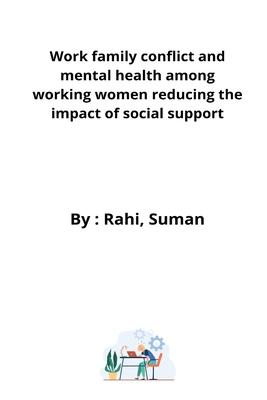INTRODUCTION The phenomenon of work-family conflict is a worldwide issue and attracts the attention of behavioural scientists and mental health specialists. Traditionally, men were breadwinners and women were homemakers who looked after and took care of family needs. In that respect, work and family domains were considered mutually exclusive and there was minor attention towards outcome of work-family interference. But in recent years, work scenario has changed as more and more women are joining various job positions. Modernizations in terms of economic growth, globalization and equality in opportunities have impacted the work life and employees’ well- being (Panatik, Badri et al., 2011). Women workers have started contributing in volume in work sector, and this contribution is expected to rise with time. In India also, particularly before independence, the women from middle and upper classes were mostly confined to their homes. However, with the formation and implementation of many protective laws and legislations for women, enhancement of educational facilities and advent of globalization; there has emerged a newer professional class of women workers from middle and upper class of the economy. Thus, Indian women are also trying to attain a new place in the world of work. Women of the present time are performing multiple roles such as that of a mother, an employee and a homemaker etc. Thus, more and more women are juggling their dual roles of family and career. Woman at job has a dual role to play towards work as well as family and failure to extend her contribution with equal efficiency makes her feel tensed which in turn give rise stress and a threat to mental health. Therefore, it is required to balance work and life efficiently. The issue of work-family conflict is strongly inclined towards combining work and family related research. Research is focused now on issues like effect of work stressors on home life, and the link of family stressors with,
| FindBook |
有 1 項符合
Work family conflict and mental health among working women reducing the impact of social support的圖書 |
 |
Work family conflict and mental health among working women reducing the impact of social support 作者:Suman 出版社:Mab-India 出版日期:2022-07-06 語言:英文 規格:平裝 / 112頁 / 22.86 x 15.24 x 0.58 cm / 普通級/ 初版 |
| 圖書館借閱 |
| 國家圖書館 | 全國圖書書目資訊網 | 國立公共資訊圖書館 | 電子書服務平台 | MetaCat 跨館整合查詢 |
| 臺北市立圖書館 | 新北市立圖書館 | 基隆市公共圖書館 | 桃園市立圖書館 | 新竹縣公共圖書館 |
| 苗栗縣立圖書館 | 臺中市立圖書館 | 彰化縣公共圖書館 | 南投縣文化局 | 雲林縣公共圖書館 |
| 嘉義縣圖書館 | 臺南市立圖書館 | 高雄市立圖書館 | 屏東縣公共圖書館 | 宜蘭縣公共圖書館 |
| 花蓮縣文化局 | 臺東縣文化處 |
|
|
圖書介紹 - 資料來源:博客來 評分:
圖書名稱:Work family conflict and mental health among working women reducing the impact of social support
|











